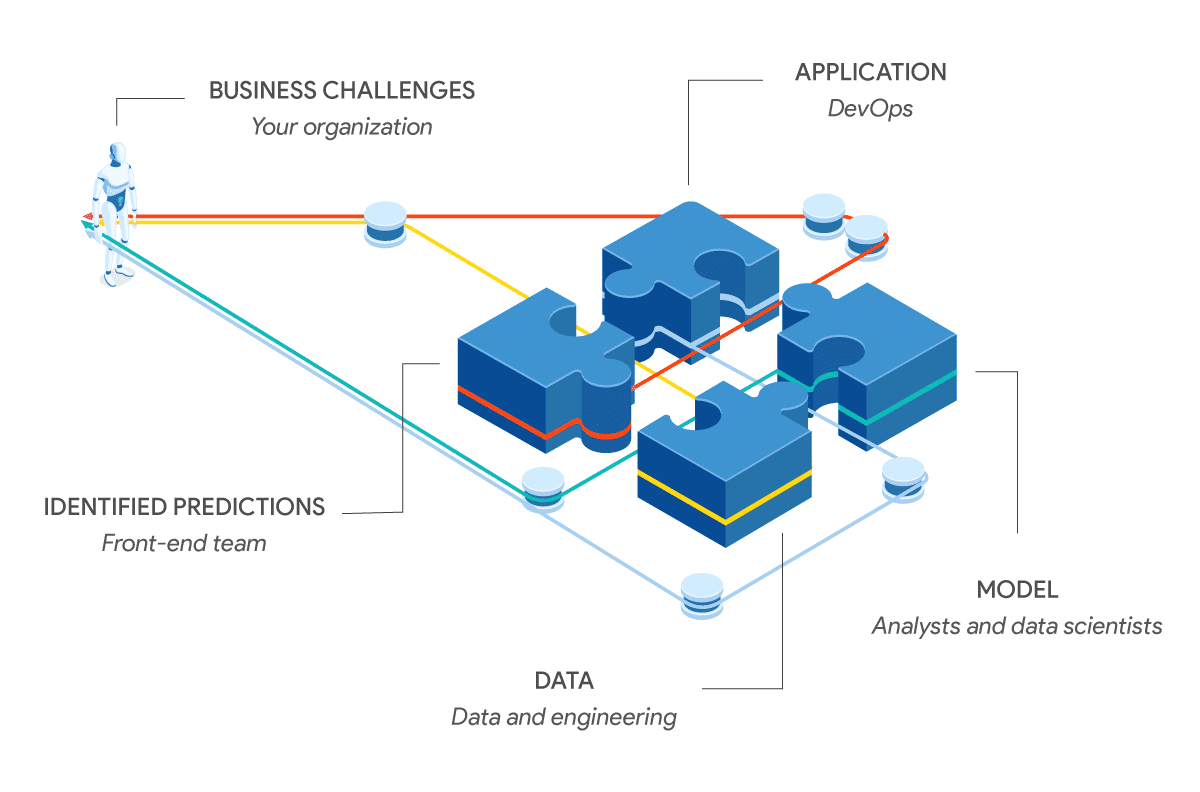The Difference Between Machine Learning (ML) and Artificial Intelligence (AI)
The Difference Between Machine Learning (ML) and Artificial Intelligence (AI)
The Difference Between Machine Learning (ML) and Artificial Intelligence (AI)
AI and Machine Learning, today.
There is no denying that AI and Machine Learning is everywhere and has become an integral part of most of our lives.
However, most people still associate artificial intelligence with far in the future dystopian worlds that are a common theme in science fiction movies. What people might not realize or are slow to comprehend is that artificial intelligence has developed so far that it has solidified its place in our day-to-day lives, so intertwined with us that it now has a presence in almost every household – Hi Siri, Hi Alexa, Google, play “Monday Morning Blues”.
AI/ML as it is commonly known as – short for artificial intelligence (AI) and machine learning (ML) is an important representation of how far technology has come and a crucial element in the evolution that is occurring within the field of computer science and data processing that is rapidly changing how industries operate and function across the board.
But, before we jump into the details and differentiation between these two concepts, let’s first cover the basics – their individual definitions.
.
What is Artificial Intelligence?
Artificial intelligence (AI) is essentially the ability of a computer in imitating intelligent human behavior. Through the use of AI, machines are able to analyze images, comprehend speech patterns, possess natural interaction capabilities and make predictions using data.
“Professor Pedro Domingos, a prominent researcher in this field, describes “five tribes” of machine learning, comprised of symbolists, with origins in logic and philosophy; connectionists, stemming from neuroscience; evolutionaries, relating to evolutionary biology; Bayesians, engaged with statistics and probability; and analogizers with origins in psychology. Recently, advances in the efficiency of statistical computation have led to Bayesians being successful at furthering the field in a number of areas, under the name “machine learning”.”
– Amazon Web Services
It is important to note that artificial is a fairly broad and general term, for the actions of any computer software in carrying the aforementioned actions. But calling any and all applications with such a broad brush stroke would be akin to calling a Perodua Myvi a “vehicle”, which it is and thus it is technically sound, but it does not justify the term, nor does it explain the specifics; and to dig deeper is to segment it into sub-concepts.
Herein lies the answer to the differentiation.
What is Machine Learning?
An offshoot of the Artificial Intelligence branch Machine learning (ML) is an AI technique that uses mathematical algorithms to create predictive models. An algorithm is used to parse data fields and to “learn” from that data by using patterns found within it to generate models. Those models are then used to make informed predictions or decisions about new data.
The predictive models are validated against known data, measured by performance metrics selected for specific business scenarios, and then adjusted as needed. This process of learning and validation is called training. Through periodic retraining, ML models are improved over time.
The key to this type of machine learning lies in the consistency of feeding more data into the machine learning algorithm, inadvertently improving its modelling. Machine learning shines in enabling your operations to handle a large influx of data and making sense of it. With the increase in digital transformation exercises occurring, companies are also facing challenges with ever-growing data growth. Sifting through these is also a burden, taking up too much manpower. With machine learning, companies are able to maintain their team’s productivity whilst alleviating the burden of data handling, whilst acting on the insights that were discovered.
“With the right data, an ML model can analyze high dimensional problems with billions of examples, to find the optimal function that can predict an outcome with a given input. ML models can usually provide statistical confidence on predictions, as well as on its overall performance. Such evaluation scores are important in the decision if you are to use an ML model or any individual prediction.”
So to answer the question:
Artificial Intelligence is the broader concept of machines being able to carry out tasks in a way that we would consider “smart”.
And,
Machine Learning is an offshoot of the AI based on the concept that we should be utilizing machines by inputting data into the software and allowing them to learn by themselves.
Explore Trainocate Malaysia’s recommended courses within the our ML and Artificial Intelligence portfolio.
1) AI-102T00: Designing and Implementing a Microsoft Azure AI Solution
Level up with Microsoft Certified: Azure AI Engineer Associate.
Gain expertise and skills needed to embed artificial intelligence capabilities into apps, including Cognitive Services, natural language processing, and conversational AI with the Azure AI Engineer Associate certification.
The AI-102T00 Designing and Implementing an Azure AI Solution training is intended for software developers wanting to build AI infused applications that leverage Azure Cognitive Services, Azure Cognitive Search, and Microsoft Bot Framework. The course will use C# or Python as the programming language.
| Code | Course Title | Days | Fees (RM) | Jan | Feb | Mar |
|---|---|---|---|---|---|---|
| AI-102T00 | Designing and Implementing a Microsoft Azure AI Solution | 4 | 3,000 | 7-10 |
2) GCPBD: Google Cloud Platform Big Data and Machine Learning Fundamentals
Unlock your data’s potential with Google Cloud.
This Google certified course introduces participants to the big data capabilities of Google Cloud. Through a combination of presentations, demos, and hands-on labs, participants get an overview of Google Cloud and a detailed view of the data processing and machine learning capabilities. This course showcases the ease, flexibility, and power of big data solutions on Google Cloud.
| Code | Course Title | Days | Fees (RM) | Jan | Feb | Mar |
|---|---|---|---|---|---|---|
| GCPBD | Google Cloud Platform Big Data and Machine Learning Fundamentals | 1 | 2,400 | 9 | 27 | 27 |
3) AWS-ML: The Machine Learning Pipeline on AWS
First purpose-built CI/CD service for machine learning.
The Machine Learning Pipeline on AWS course explores how to the use of the iterative machine learning (ML) process pipeline to solve a real business problem in a project-based learning environment. Students will learn about each phase of the process pipeline from instructor presentations and demonstrations and then apply that knowledge to complete a project solving one of three business problems: fraud detection, recommendation engines, or flight delays.
By the end of this AWS course, students will have successfully built, trained, evaluated, tuned, and deployed an ML model using Amazon SageMaker that solves their selected business problem. Learners with little to no machine learning experience or knowledge will benefit from this course. Basic knowledge of Statistics will be helpful.
| Code | Course Title | Days | Fees (RM) | Jan | Feb | Mar |
|---|---|---|---|---|---|---|
| AWS-ML | The Machine Learning Pipeline on AWS | 4 | 7,200 | 9-12 | 7-10 |









